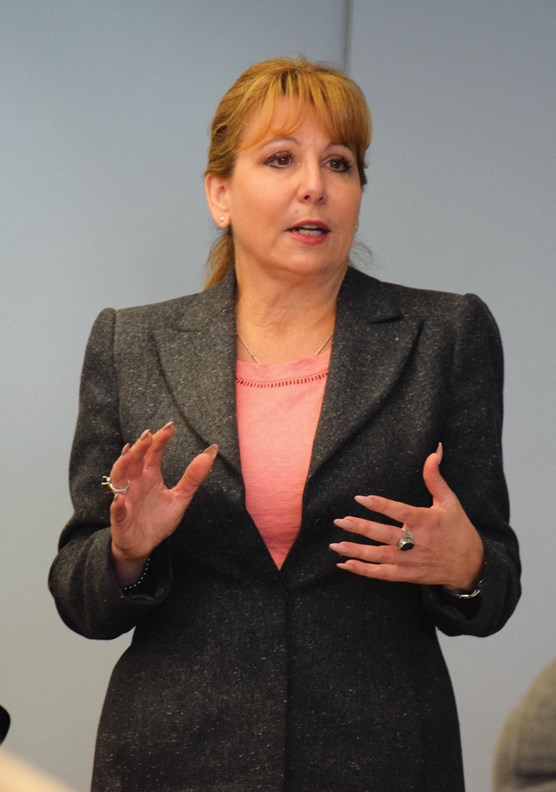BC Liberal leadership candidate Dianne Watts told an audience in Sechelt this week that the Liberals lost the last election “because we stopped listening, and there was a disconnect between … the good job that the BC Liberals were doing and how that affected people and their lives.”
Watts is one of six candidates still in the race, along with sitting MLAs Andrew Wilkinson, Todd Stone, Mike de Jong, Michael Lee and Sam Sullivan, and she also said the party needs to come out of the leadership race united.
“We need to make sure we can win those 11 seats back and we need to make sure that we hold the [internal] coalition together. We are a free enterprise party. We support innovation. We support entrepreneurship. But, we have to be socially progressive and make sure that we are bringing in the next generation.”
Watts entered the race after stepping down as Conservative MP for South Surrey-White Rock, a seat she won in 2015 after serving as mayor of Surrey for three straight terms. In an interview just before the Dec. 4 Liberal party event, Watts told Coast Reporter that after being approached about getting into provincial politics, she spent a lot of time talking to constituents before making her decision.
Watts dealt with several high-profile transportation issues as part of the Mayors’ Council on the Lower Mainland, and she said she views BC Ferries as an extension of the highway system.
“If people have to go to work [by ferry], that’s part of the economy, so we have to make sure that they have the opportunity to get to work back and forth without much interruption. I look at it as part of the highway system, part of the transportation system, and it has to really support communities.”
Watts is not, however, offering any specific policies on the future of ferries at this point in the campaign.
“As we get closer to the election we will develop a platform – I don’t want to give all of that away three-and-a-half years in advance,” she said.
In a Dec. 2 debate in Kelowna, Watts was challenged by Stone and Wilkinson on her lack of specific platform proposals like Stone’s transportation plan that includes eliminating ferry reservation fees and offering tax credits to regular ferry users.
“I’m not going to go by the timeframe of Todd Stone or Andrew Wilkinson. I made the commitment when I stepped into this race that I was going to travel around the province and talk to British Columbians and find out what their issues are and how they want to be part of the overall vision and what they see for their province… A couple of days ago I released the first piece of what I’ve undertaken.”
Watts’ multi-point list of the kind of future she wants to see for B.C. includes: “A B.C. with a transportation master plan for the entire province, one that puts the province, Ottawa and local municipalities at the same table, that gets on with building transportation infrastructure… A B.C. where Site C goes ahead, because it means 100 years of clean energy… A B.C. where the revenue from the sale of marijuana stays in the communities where it’s sold, because it’s going to be needed to pay for the policing, regulation and social services that come with legalization… A B.C. where our forestry sector is strong and renewable.”
One issue the Liberal leadership candidates agree on is their opposition to the NDP government’s proposed referendum on proportional representation.
“First and foremost, if you’re going to change how people elect their representatives, you need to go to the people and ask them, ‘Would you like to change the system? Do you want electoral reform?’ That was not done,” Watts said, adding that she feels the current government is dictating whether change is needed, what the referendum question should be and that it should have a 50 per cent plus one threshold instead of the higher thresholds used for previous votes on electoral reform.
“We know through proportional representation that large urban centres carry most of the power, so what you’re doing is taking away the voices of people in rural communities, smaller communities, and that’s not fair.”
The BC Liberals will choose their new leader over three days of voting starting Feb. 1, 2018.



